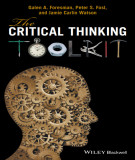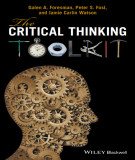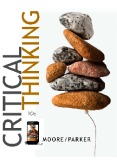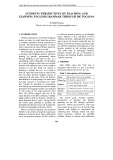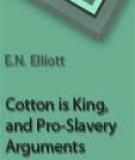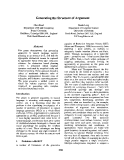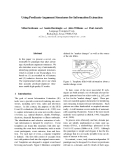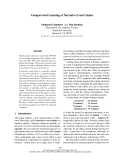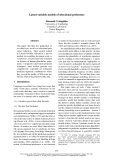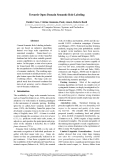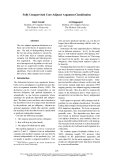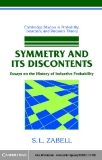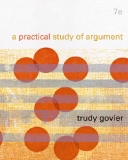
Inductive arguments
-
Continued part 1, part 2 of ebook "The critical thinking toolkit" has presents the following content: tools for critical thinking about induction; tools for critical thinking about experience and error; tools for critical thinking about justification; tools for critical thinking about science; tools from rhetoric, critical theory, and politics; recommended web sites;...
 194p
194p  dieptieuung
dieptieuung
 20-07-2023
20-07-2023
 8
8
 3
3
 Download
Download
-
Part 1 of ebook "The critical thinking toolkit" has presents the following content: basic tools for critical thinking about arguments; more tools for critical thinking about arguments; tools for deductive reasoning with categories; tools for deductive reasoning with claims; tools for detecting informal fallacies;...
 183p
183p  dieptieuung
dieptieuung
 20-07-2023
20-07-2023
 6
6
 2
2
 Download
Download
-
Along with Moore & Parker’s engaging writing style and the wealth of topical exercises and examples that are relevant to students’ lives, Connect Critical Thinking helps ensure that students can come to class confident and prepared. What other course provides students with skills they can apply so broadly to success in school and success in life?
 578p
578p  phuong10693
phuong10693
 20-06-2023
20-06-2023
 7
7
 3
3
 Download
Download
-
Teaching grammar in the foreign language classes is a topic for which there has not been a complete agreement among researchers or teachers. The theoretical argument on which type of instruction is more efficient, inductive or deductive, has not come to an end.
 3p
3p  vianapatricia
vianapatricia
 10-06-2022
10-06-2022
 33
33
 5
5
 Download
Download
-
We introduce two Bayesian models for unsupervised semantic role labeling (SRL) task. The models treat SRL as clustering of syntactic signatures of arguments with clusters corresponding to semantic roles. The first model induces these clusterings independently for each predicate, exploiting the Chinese Restaurant Process (CRP) as a prior. In a more refined hierarchical model, we inject the intuition that the clusterings are similar across different predicates, even though they are not necessarily identical.
 11p
11p  bunthai_1
bunthai_1
 06-05-2013
06-05-2013
 45
45
 3
3
 Download
Download
-
THERE is now but one great question dividing the American people, and that, to the great danger of the stability of our government, the concord and harmony of our citizens, and the perpetuation of our liberties, divides us by a geographical line.
 506p
506p  nhokheo5
nhokheo5
 25-04-2013
25-04-2013
 55
55
 3
3
 Download
Download
-
This paper demonstrates that generating arguments in natural language requires planning at an abstract level, and that the appropriate abstraction cannot be captured by approaches based solely upon coherence relations. An abstraction based planning system is presented which employs operators motivated by empirical study and rhetorical maxims. These operators include a subset of traditional deductive rules of inference, argumentation theoretic rules of refutation, and inductive reasoning patterns. ...
 7p
7p  bunrieu_1
bunrieu_1
 18-04-2013
18-04-2013
 44
44
 3
3
 Download
Download
-
In this paper we present a novel, customizable IE paradigm that takes advantage of predicate-argument structures. We also introduce a new way of automatically identifying predicate argument structures, which is central to our IE paradigm. It is based on: (1) an extended set of features; and (2) inductive decision tree learning. The experimental results prove our claim that accurate predicate-argument structures enable high quality IE results.
 8p
8p  bunbo_1
bunbo_1
 17-04-2013
17-04-2013
 38
38
 1
1
 Download
Download
-
Hand-coded scripts were used in the 1970-80s as knowledge backbones that enabled inference and other NLP tasks requiring deep semantic knowledge. We propose unsupervised induction of similar schemata called narrative event chains from raw newswire text. A narrative event chain is a partially ordered set of events related by a common protagonist. We describe a three step process to learning narrative event chains. The first uses unsupervised distributional methods to learn narrative relations between events sharing coreferring arguments.
 9p
9p  hongphan_1
hongphan_1
 15-04-2013
15-04-2013
 53
53
 1
1
 Download
Download
-
This paper describes the application of so-called topic models to selectional preference induction. Three models related to Latent Dirichlet Allocation, a proven method for modelling document-word cooccurrences, are presented and evaluated on datasets of human plausibility judgements. Compared to previously proposed techniques, these models perform very competitively, especially for infrequent predicate-argument combinations where they exceed the quality of Web-scale predictions while using relatively little data. ...
 10p
10p  hongdo_1
hongdo_1
 12-04-2013
12-04-2013
 36
36
 2
2
 Download
Download
-
Current Semantic Role Labeling technologies are based on inductive algorithms trained over large scale repositories of annotated examples. Frame-based systems currently make use of the FrameNet database but fail to show suitable generalization capabilities in out-of-domain scenarios. In this paper, a state-of-art system for frame-based SRL is extended through the encapsulation of a distributional model of semantic similarity. The resulting argument classification model promotes a simpler feature space that limits the potential overfitting effects....
 10p
10p  hongdo_1
hongdo_1
 12-04-2013
12-04-2013
 45
45
 1
1
 Download
Download
-
The core-adjunct argument distinction is a basic one in the theory of argument structure. The task of distinguishing between the two has strong relations to various basic NLP tasks such as syntactic parsing, semantic role labeling and subcategorization acquisition. This paper presents a novel unsupervised algorithm for the task that uses no supervised models, utilizing instead state-of-the-art syntactic induction algorithms. This is the first work to tackle this task in a fully unsupervised scenario. ...
 11p
11p  hongdo_1
hongdo_1
 12-04-2013
12-04-2013
 34
34
 1
1
 Download
Download
-
This volume brings together a collection of essays on the history and philosophy of probability and statistics by one of the eminent scholars in these subjects. Written over the last fifteen years, they fall into three broad categories. The first deals with the use of symmetry arguments in inductive probability, in particular, their use in deriving rules of succession (Carnap’s “continuum of inductive methods”).
 293p
293p  camchuong_1
camchuong_1
 04-12-2012
04-12-2012
 39
39
 3
3
 Download
Download
-
This book is written for all those interested in arguments and arguing—and especially for students enrolled in courses designed to improve their critical thinking abilities. My goal in this work is to present enough theory to explain why certain kinds of argument are good or bad and enough illustrations and examples to show how that theory can be applied. The book includes lively illustrations from contemporary debates and issues and ample student exercises. Responses to some exercises are provided within the book, while the remainder are answered in a manual available to instructors.
 432p
432p  taurus23
taurus23
 27-09-2012
27-09-2012
 67
67
 16
16
 Download
Download
-
Induction is another way to organize a verbal or written personal-opinion argument. Look at the following examples. Notice how the deductive response begins with an opinion.
 10p
10p  kathy208
kathy208
 12-08-2010
12-08-2010
 67
67
 11
11
 Download
Download
-
How can you quickly and proficiently construct both personal-opinion and fact-based arguments that demonstrate coherence? By starting with a clear method of organization. There are two ways to organize an argument: deduction and induction. Let's start with the personal-opinion argument and deduction.
 10p
10p  kathy208
kathy208
 12-08-2010
12-08-2010
 92
92
 14
14
 Download
Download
CHỦ ĐỀ BẠN MUỐN TÌM








